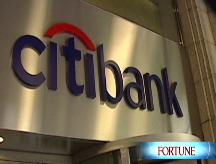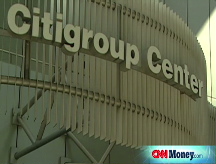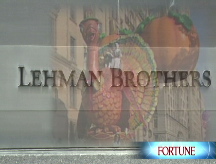Why the banks need stronger medicine
The feds have poured $45 billion into Citi, but so far even costly half-measures haven't worked during this crisis.

NEW YORK (Fortune) -- The latest round of government help for Citi buys the troubled bank some time. But the financial sector will need much stronger medicine before a recovery can get under way.
The feds agreed Sunday night to guarantee $306 billion worth of troubled assets for the troubled New York bank. The Treasury also poured $20 billion into Citi via a purchase of preferred stock, adding to the $25 billion stake the government took in October via the Troubled Asset Recovery Program.
The capital infusion and asset guarantees reduce the threat of a sudden collapse at Citi (C, Fortune 500), the biggest U.S. bank by assets with more than $2 trillion on its balance sheet. The moves also help the rest of the banks by showing that the government won't permit another disorderly failure along the lines of September's collapse of broker-dealer Lehman Brothers, which set off a flight from risky assets that continues to this day.
Still, the fact that Citi needed a new lifebuoy from the government less than a month after getting an infusion via the TARP capital purchase program shows how the entire financial system is laboring under an unmanageable debt load. And that won't be changed by any of the plans being rolled out on an almost daily basis by the Fed and Treasury, including Tuesday's proposals to make $800 billion available to holders of securities backed by consumer and mortgage debt.
The overriding problem, analysts say, calls out for much larger infusions of taxpayer funds, in the name of stabilizing the financial system - as well as restructurings that give officials time to completely fix problems at troubled institutions.
"'Over-levered' is the purest description of the U.S. financial system today," Friedman Billings Ramsey analyst Paul Miller wrote in a report last week. "At eight of the largest financial institutions, tangible equity equals 3.4% of assets, which implies 29x leverage. If this wasn't bad enough, we expect that current tangible common equity will be essentially wiped out by losses from existing loan and security books."
Indeed, with house prices falling after a decade-long run-up and unemployment last month hitting a 14-year high, U.S. banks face increasing loan losses on mortgages, commercial real estate and credit cards. FBR's Miller writes that the eight biggest U.S. firms - Citi, Bank of America (BAC, Fortune 500), JPMorgan Chase (JPM, Fortune 500), Goldman Sachs (GS, Fortune 500), Morgan Stanley (MS, Fortune 500), Wells Fargo (WFC, Fortune 500), AIG (AIG, Fortune 500) and General Electric's (GE, Fortune 500) financial services arm - need at least $1 trillion in new capital to weather the coming recession without the prospect of an institutional failure.
He says the most likely scenario is that these eight giants will face losses of around $400 billion over the life of their existing loan portfolios - but cautions that those losses could reach almost $600 billion.
"If our models are too conservative with respect to losses," he writes, "more capital will be needed going forward."
Investors have become accustomed to banks' voracious need for capital at a time of global deleveraging. Firms around the globe have raised hundreds of billions of dollars in new capital over the past year. But the deepening problems at one of the biggest capital-raisers - Citi, which has brought in $50 billion from private investors in addition to the funds it has gotten from the government - suggest that merely raising more money isn't going to be enough to see many firms through the worst of the downturn.
"We estimate C's risky assets to be roughly $120 billion," Oppenheimer analyst Meredith Whitney writes Monday, "but the company has almost $600 billion in consumer and card loans. We are unclear exactly which assets were targeted in the $306 billion."
Even with more capital in hand, the banks' problems aren't just going to go away. Indeed, the KBW Bank stock index was down 37% this month heading into Monday, in a vicious selloff that started after Treasury Secretary Henry Paulson distributed the first round of TARP checks to the biggest banking companies.
One reason is that the piecemeal approach to government support - $25 billion here, $20 billion there - isn't going to persuade investors to pour new money into an institution such as Citi with a balance sheet measuring in the trillions, says Mark Sunshine, president of middle market lender First Capital. He says that for truly troubled institutions such as Citi, with risky assets running into the tens of billions of dollars in a souring economy, the only answer is full government nationalization.
Once the government takes a bank over and wipes out its shareholders, he says, officials can wrap bad assets into a so-called bad bank to be run off over a period of years, then repackage the good bank and sell it off to private investors. He rejects halfway measures such as loan guarantee programs and partial nationalizations such as the feds tried with AIG, Fannie Mae and Freddie Mac.
Until there's clarity as to which banks are truly solvent and which are subject to a government takeover, Sunshine says, Treasury Secretary Henry Paulson's hope of attracting private capital back into the finance sector will remain a pipe dream.
"The fastest way to attract capital is to seize the troubled banks," says Sunshine. "You've got to serially take over every one of them."
That said, Sunshine doesn't believe many of the biggest institutions would need to be nationalized. He says big banks other than Citi appear to be much less apt to be overwhelmed by souring loans, and believes the cost of dealing with the troubled banks could run much lower than the $1 trillion-plus price tag projected by FBR's Miller.
The problems in the banking sector are made that much more pressing, Sunshine adds, by the fear of deflation now looming over the market in the wake of last week's rare decline in the consumer price index.
Sunshine says that unless the government stops the deflationary worries through aggressive monetary policy and heavy fiscal stimulus, the banking problems will only get worse. Government officials fear deflation because it increases the value of cash, which encourages hoarding that reduces economic activity, increasing the debt burden felt by firms and individuals.
"Having deflation is like pouring hydrochloric acid over your loan portfolio," he says. ![]()
-
 The retail giant tops the Fortune 500 for the second year in a row. Who else made the list? More
The retail giant tops the Fortune 500 for the second year in a row. Who else made the list? More -
 This group of companies is all about social networking to connect with their customers. More
This group of companies is all about social networking to connect with their customers. More -
 The fight over the cholesterol medication is keeping a generic version from hitting the market. More
The fight over the cholesterol medication is keeping a generic version from hitting the market. More -
 Bin Laden may be dead, but the terrorist group he led doesn't need his money. More
Bin Laden may be dead, but the terrorist group he led doesn't need his money. More -
 U.S. real estate might be a mess, but in other parts of the world, home prices are jumping. More
U.S. real estate might be a mess, but in other parts of the world, home prices are jumping. More -
 Libya's output is a fraction of global production, but it's crucial to the nation's economy. More
Libya's output is a fraction of global production, but it's crucial to the nation's economy. More -
 Once rates start to rise, things could get ugly fast for our neighbors to the north. More
Once rates start to rise, things could get ugly fast for our neighbors to the north. More










